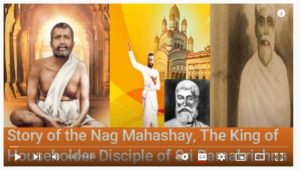The Master As I Saw Him
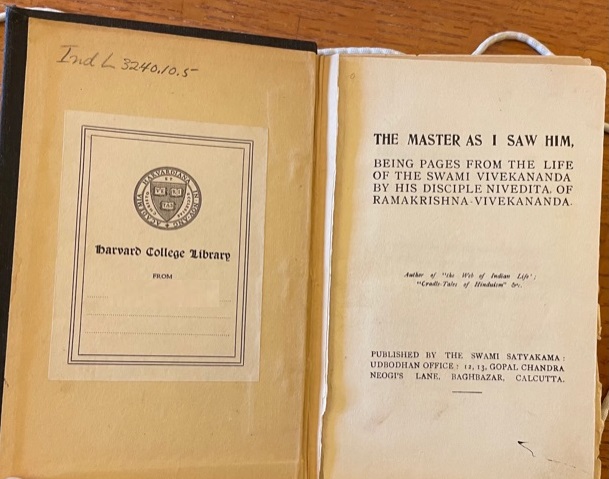
Being Pages From the Life of the Swami Vivekananda by his disciple Nivedita of Ramakrishna Vivekananda.
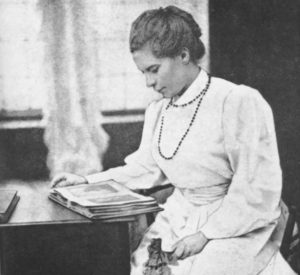
I
IN LONDON, 1895

XIII
GLIMPSES OF THE SAINTS
The Swami talked with me one day, of the saints he had seen. The subject began perhaps with that Nag Mahashoy, who had paid him a visit in Calcutta, only a few weeks before, and whose death must have occurred a day or two previous to our leaving.
The news reached him, while the ship was still in the River. Nag Mahashoy, he said repeatedly, was “one of the greatest of the works of Ramakrishna Paramahamsa.” He described his impassioned idea of the necessity of bhakti, and how he would refuse to give food, to the body of one so worthless and unfortunate as he himself was, in never yet having loved God.
He told me, too, how on one occasion Nag Mahashoy had cut down the ridgepole of his cottage, in order to make the fire to cook food for a guest.
The talk passed perhaps, to the story of that youth who was touched by Sri Ramakrishna’s hand, and who never afterwards spoke, save to say “My Beloved! My Beloved!” He lived ten years, without other speech than this.
There were many stories current amongst the monks, of persons who had come to Dakshineshwar during the life-time of their Master, and being touched by his hand, went immediately into Samadhi. In many cases, nothing more was known of the visitants than this.
This was notably true of a certain woman, who had driven to the Temple, and of whom Sri Ramakrishna had said at once that she was “a fragment of the Madonnahood of the worlds.” He had offered salutation to this guest, in the name of the Mother, throwing flowers on her feet, and burning incense before her, and she, as was not perhaps surprising, had passed immediately into the deepest Samadhi.
From this, however, to everyone’s surprise, it had proved most difficult to recall her. It was two or three hours before she awoke from her ecstasy, and when this happened her whole appearance it is said, was as that of one who had been intoxicated. Much relieved that all was ending thus well, however, – for it had been feared that her Samadhi might last much longer, and her family, wherever they were, feel justly disturbed – all lent their aid to the departure of the stranger from the temple, and none had the forethought to make a single enquiry as to her name or abode. She never came again. Thus her memory became like some beautiful legend, treasured in the Order as witness to the worship of Sri Ramakrishna for gracious and noble wifehood and motherhood. Had he not said of this woman, “a fragment of the eternal Madonnahood”?

In my own ignorance of religious matters in general, my mind felt out much after these stray children of the central impulse, shining like distant stars in their own orbits, as it were, and never returning upon us or ours. I wanted to know whether, even in lives so fair as theirs, it might perhaps be possible to forget the great experience of a day long years ago, so that the memory of the great Teacher and his touch would become to them also a far-away incident, a story heard in a dream, even as their visits had become to those who saw them pass.
I wanted in fact to be able to measure the relative values of many things, and I left out of sight at that time altogether, – having not yet begun to consider it – the preparedness which the national idea has produced in every Hindu for such experiences.
But the Swami could not understand my mental twilight. “Was it a joke,” he said, “that Ramakrishna Paramahamsa should touch a life? OF COURSE he made new men and new women of those who came to him, even in these fleeting contacts!”
And then he would tell story after story of different disciples. How one came, and came again, and struggled to understand. And suddenly to this one, he turned and said “Go away now, and make some money! Then come again!” And that man to-day was succeeding in the world, but the old love was proving itself ever alight. There was no mention of the defects of this, or any other of whom he told. As one listened, it was the courage and nobility of each man’s struggle that one felt. Why should every man force himself to be a monk? Nay, how could every man, till his other work was done? But there would be no mistake in the end. All these would be his at last.
Similarly, of the saints. His whole soul went to the interpretation of each, as he rose before him, and it would have been impossible at that moment for the listener to think of any other as higher.
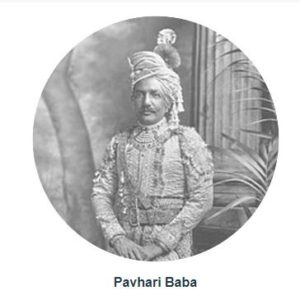
Of Pavhari Baba he had so striven to tell us everything, that it would have seemed scarcely delicate to press vague questions upon him further. All who had been with him at the time of the saint’s death knew that he held him second only to Sri Ramakrishna, knew that there was none whose love to himself he had more valued.
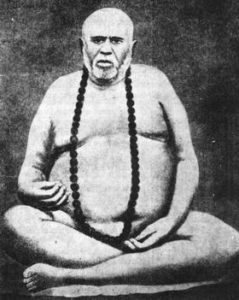
Now he set himself to tell stories for an hour, of one or two others whom he had met. TRAILINGA SWAMI he had seen when very, very old, more than a hundred, apparently. He was always silent. He would lie in a Siva-temple in Benares, with his feet on the image, A madcap, seemingly. He allowed people, however, to write him questions, and sometimes, if he fancied one, would write an answer in Sanskrit. This man was lately dead.
RAGHUNATH DASS had been dead two months, when the Swami reached his ashrama. He had been a soldier originally in the British service, and as an outpost sentinel was faithful and good, and much beloved by his officers. One night, however, he heard a Ram-Ram party. He tried to do his duty, but ‘ Jaya Bolo Ram Chunder ki jai j ’ maddened him. He threw away his arms and uniform, and joined the worship.
Jaya Bolo Ram Chunder ki jai ! — Hindi words which translate as’ “Salutations to the lord Ram!”
This went on for some time, till reports came to the Colonel. He sent for Raghunath Dass, and asked him whether these were true, and if he knew the penalty. Yes, he knew it. It was to be shot.
“Well,” said the Colonel, “Go away this time, and I shall repeat it to no one. This once I forgive you. But if the same thing happens again, you must suffer the penalty.”
That night, however, the sentinel heard again the Ram-Ram party. He did his best, but it was irresistible. At last he threw all to the winds, and joined the worshippers till morning.
Meanwhile, however, the Colonel’s trust in Raghunath Dass had been so great that he found it difficult to believe anything against him, even on his own confession. So in the course of the night, he visited the outpost, to see for himself. Now Raghunath Dass was in his place, and exchanged the word with him three times. Then, being reassured, the Colonel turned in, and went to sleep.
In the morning appeared Raghunath Dass to report himself and surrender his arms. But the report was not accepted, for the Colonel told him what he had himself seen and heard.
Thunderstruck, the man insisted by some means on retiring from the service. Rama it was who had done this for His servant. Henceforth, in very truth, he would serve no other.
“He became a Vairaj,” said the Swami, “on the banks of the Saraswati. People thought him ignorant, but I knew his power. Daily he would feed thousands. Then would come the grain-seller, after a while, with his bill. ‘H’m!’ Raghunath Dass would say, ‘A thousand rupees you say? Let me see. It is a month I think since I have received anything. This will come, I fancy, to-morrow.’ And it always came.”
Someone asked him if the story of the Ram-Ram party were true.
“What’s the use of knowing such things?” he answered.
“I do not ask for curiosity,” urged the questioner, “but only to know if it is possible for such things to happen!”
Nothing is impossible with the Lord!” answered Raghunath Dass. . . .
“I saw many great men,” went on the Swami, “in Hrishikesh. One case that I remember was that of a man who seemed to be mad. He was coming nude down the street, with boys pursuing, and throwing stones at him. The whole man was bubbling over with laughter, while blood was streaming down his face and neck. I took him, and bathed the wound, putting ashes* on it, to stop the bleeding. And all the time, with peals of laughter, he told me of the fun the boys and he had been having, throwing the stones. ‘So the Father plays,’ he said.”
“Many of these men hide, in order to guard themselves against intrusion. People are a trouble to them. One had human bones strewn about his cave, and gave it out that he lived on corpses. Another threw stones. And so on ” . . . .
“Sometimes the thing comes upon them in a flash. There was a boy, for instance, who used to come to read the Upanishads with Abhedananda. One day he turned and said ‘Sir, is all this really true?’
“Oh yes!” said Abhedananda, “it may be difficult to realise, but it is certainly true.”
“And next day, that boy was a silent sannyasin, nude, on his way to Kedar Nath!”
“What happened to him? you ask – He became silent!”
“But the sannyasin needs no longer to worship, or to go on pilgrimage, or perform austerities. What, then, is the motive of all this going from pilgrimage to pilgrimage, shrine to shrine, and austerity to austerity? He is acquiring merit, and giving it to the world!”
And then, perhaps, came the story of Shibi Rana. “Ah yes!” exclaimed the teller, as he ended, “these are the stories that are deep in our nation’s heart! Never forget that the sannyasin takes two vows, one to realise the truth, and one to help the world, and that the most stringent of stringent requirements is that he should renounce any thought of heaven!”
* These ashes are made by burning a piece of cotton cloth. – N.
